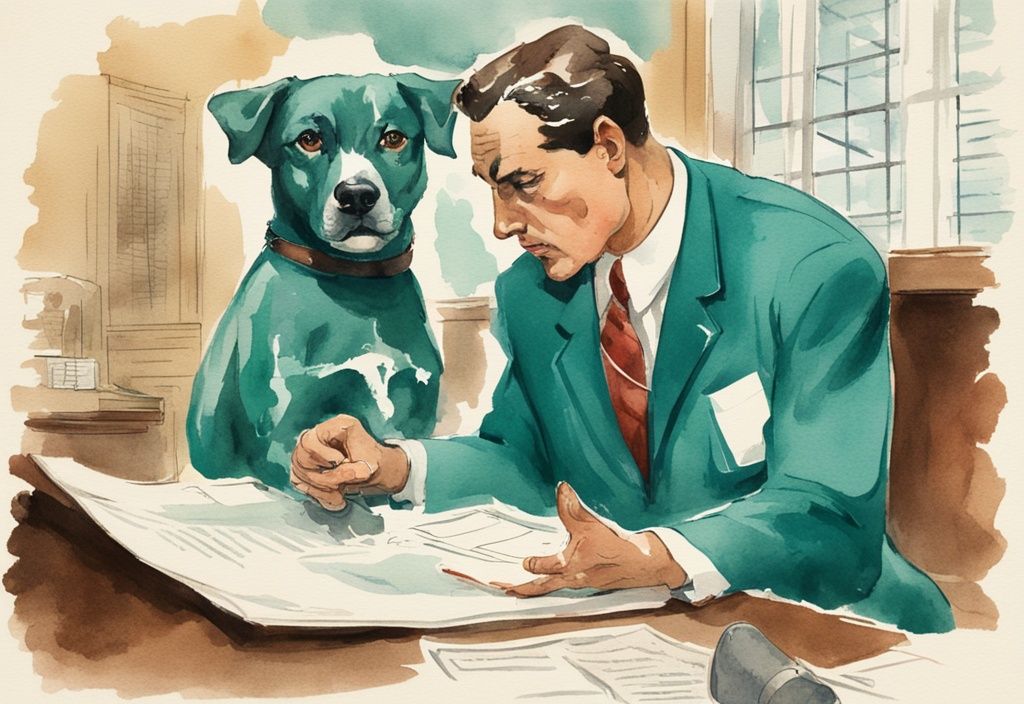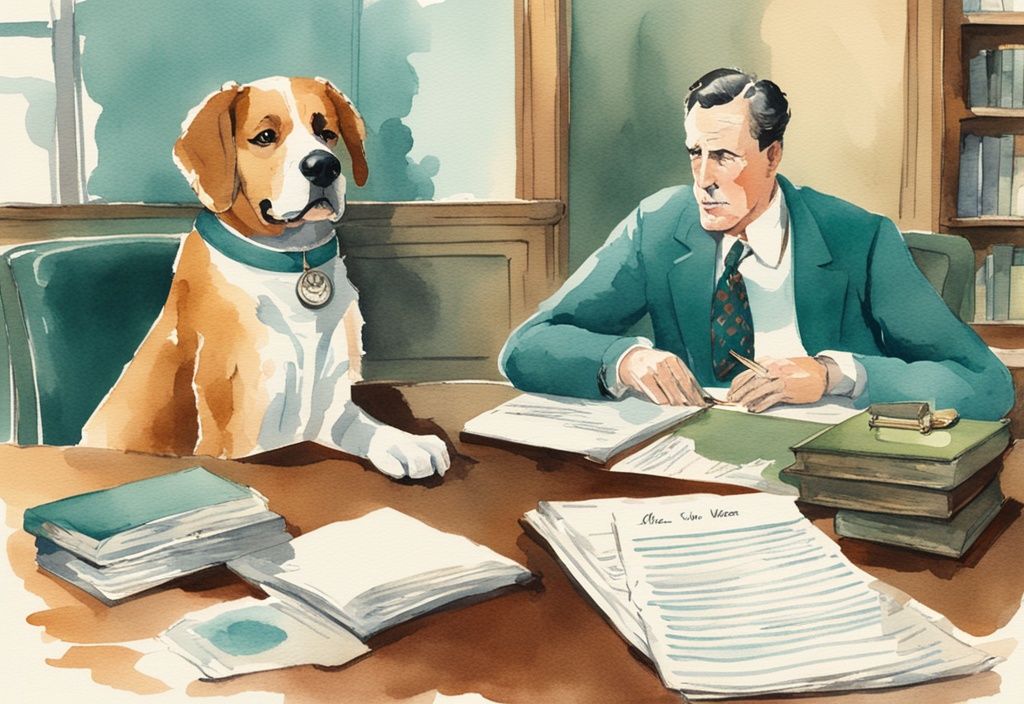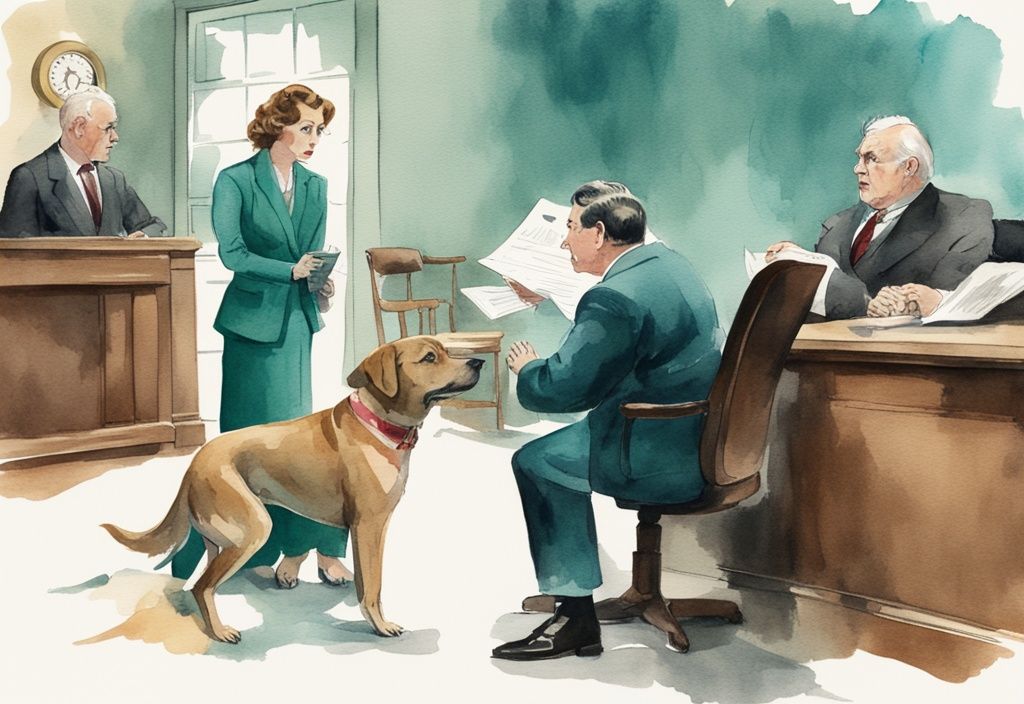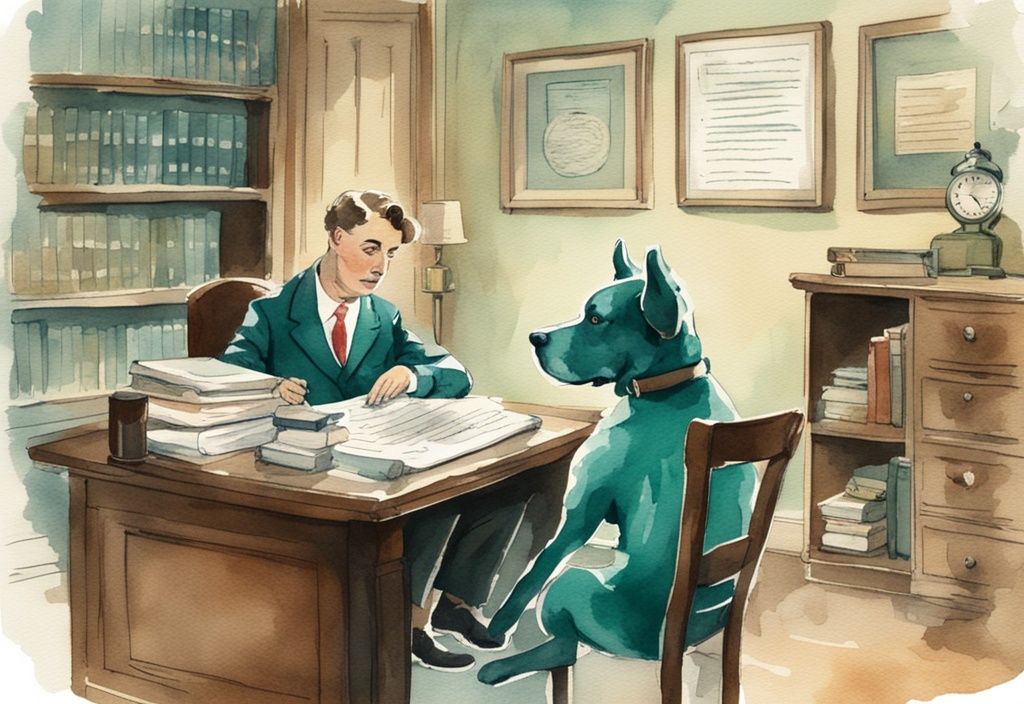Has your dog been attacked by another canine? As a fellow dog lover, I truly understand the panic and confusion that ensues. My heart goes out to you and your furry friend. The question that immediately pops into mind in such a muddle is, “What are my rights?”
I’ve crafted this user-friendly guide to help you navigate these murky waters, addressing everything from the immediate medical care for your pet, to understanding your legal rights in this deeply distressing situation. You’ll learn how to deal with even the most non-compliant dog owners and unravel the complexities of possible legal recourse.
The journey ahead may be overwhelming but remember, knowledge is power. As you read on, you’ll be better prepared for the drama life has thrown at you, turning this harrowing experience into a stepping stone towards a more secure future for you and your beloved pet.
Essential Actions to Take After Your Dog is Attacked
When your dog was attacked by another dog, what are your rights? Immediate action is crucial. The primary step is to ensure your dog’s well-being by seeking veterinary care right away, especially if the injuries are severe. It’s quite common that in the chaos and distress of the moment, both you and your dog might get hurt. Assess the injuries sustained by you and your furry friend immediately to determine the urgency of medical care needed. Even if the injuries look minor, it’s still vital to get medical attention for yourself and veterinary care for your dog to rule out any hidden issues.
Documentation is key following such an incident, and you can find helpful guidelines on veterinary care and recommendations for your pet at https://www.aaha.org/pet-owner-resources/. Keep meticulous records of all medical treatments your dog receives and all associated bills and payments. Taking pictures of your pet’s injuries immediately after the attack can serve as essential evidence if you decide to pursue compensation or legal action. Equally important is obtaining contact information, insurance details, and the name of the attacking dog from its owner.
Performing a Quick Assessment of Injuries
Immediately after the attack, take a moment to check your dog’s physical condition. Look for visible wounds, bleeding, limping, or any signs of distress. Thoroughly examine for puncture wounds, scratches, or any unusual behavior that might indicate internal injuries. A rapid assessment can help prioritize the actions needed to ensure your dog’s health and safety.
Acquiring Emergency Veterinary Care
If your dog has visible or severe injuries, head to the nearest veterinary clinic without delay. Professional examination is essential even if the injuries appear minor, as some traumatic injuries are not immediately apparent. Follow the veterinarian’s recommended treatment plan diligently and document every treatment provided. Maintaining a detailed record of medical care will support your case should you decide to seek compensation.
Recording Important Details About the Incident
Proper documentation of the incident can be invaluable. Record the date, time, and exact location of the attack. Take pictures of the scene, including any relevant surroundings that might support your case. Gathering testimonies from witnesses can be beneficial; collect their names and contact information as their statements can add credibility to your account of the incident.
Understanding and executing these steps promptly can significantly affect the outcome of any legal or compensation claims you might pursue. Comprehensive documentation and immediate medical care are your best allies in navigating through the aftermath of your dog being attacked. This structure ensures that you are well-prepared to address the situation effectively, safeguarding both your and your dog’s rights.
Interacting with the Attacking Dog’s Owner
When another dog attacks your beloved furry friend, it’s essential to identify and gather key information from the attacking dog’s owner to protect your rights and explore potential legal actions. Start by pinpointing who owns the aggressive dog. Politely but firmly request their contact details, including their name, address, and phone number. Snap a quick photo of their driver’s license for a reliable record. If the altercation happens in a public place, ensure you leave only after securing the owner’s contact information. This vital first step paves the way for follow-up actions and possible compensation claims.
Collecting Critical Contact and Insurance Details
Once you have established contact, move on to requesting details about their homeowner’s or renter’s insurance. These insurance policies are crucial when filing compensation claims. Make sure to ask for the owner’s name, address, and contact number if you haven’t already. Then, inquire about their insurance provider and policy details. This information is vital as it can significantly influence the process of claiming veterinary and other expenses incurred due to the attack. Having these details on hand will streamline any claims process and ensure you are well-equipped for future legal or financial proceedings.
Handling a Non-cooperative Dog Owner
If you encounter a non-cooperative owner, your approach needs to be tactical and evidence-based. Should the owner refuse to provide their information, discreetly photograph them and the license plate of their vehicle. This visual evidence can be incredibly beneficial later. Afterward, contact animal control to report the incident. Animal control officials can enforce compliance and officially document the incident, which is crucial for building a strong case. Gather as much evidence as possible, including photos of injuries, witness testimonies, and any interactions with the uncooperative owner. Documenting everything comprehensively ensures that your claim has a solid foundation and clearly portrays the event.
How to Report a Dog Attack
When faced with the distressing situation of another dog attacking your precious pet, knowing the right steps to take can make all the difference in ensuring justice and safety. Below you’ll find detailed guidance on who to contact and why it’s crucial to file an official report. Your rights and your pet’s well-being can greatly benefit from these actions.
Reaching out to Required Authorities
Once your furry friend is out of immediate danger, it’s essential to take action right away. Start by contacting local animal control. Filing a dog bite report is the initial move to get an official investigation rolling. If you’re wondering why your dog is exhibiting unusual behaviors, such as panting at night, you may want to learn more about it in our article on why is my dog panting at night. Authorities will assess the aggressor dog’s vaccination history and could even quarantine it if deemed necessary. Keep in touch with them regularly to ensure the incident is thoroughly documented and investigated.
- Call animal control and the police immediately after your pet is safe. The faster you report, the quicker action can be taken.

The Importance of Filing an Official Report
Filing an official report is more than just a formality. It creates a documented record of the incident, which can be incredibly beneficial if you seek claims against the dog owner. Additionally, having your vet document the attack in medical records can be invaluable. This documentation acts as solid evidence during legal proceedings or insurance claims, protecting not only your rights but also those of your beloved pet.
- Ensure your veterinarian documents the attack in your pet’s medical records. This step can significantly bolster your case.
Exploring Legal Rights and Compensation Claims
When your beloved dog has been attacked by another dog, it’s crucial to understand your rights and the steps you can take to seek justice and compensation. This section delves into how you can handle the aftermath, what evidence to collect, and the kinds of compensation you might be entitled to.
- Collect evidence such as photos, veterinary bills, witness statements, and any prior bite reports from animal control.
Compensation for Veterinary and Other Expenses
After an attack, dealing with veterinary expenses can quickly become overwhelming. Vet care is vital but often costly, from emergency treatments to ongoing care. Make sure to document everything meticulously—keep those bills, prescriptions, and any receipts for necessary supplies or boarding costs. These records will form the backbone of your compensation claim.
Sometimes, you might find it easier to approach the owner of the other dog directly. Explain the situation and present your compiled expenses. You’d be surprised how often a straightforward conversation can resolve the issue, saving you both from lengthy legal battles.
Dealing with Severe Outcomes: Who is Liable?
In more tragic circumstances, like if your dog has been seriously injured or needs to be euthanized, establishing liability becomes even more critical. The owner of the attacking dog might be required to reimburse you for the initial cost of your pet and related expenses.
In the heart-wrenching situation where your dog passes away due to the injuries, you have the right to claim the true market value of your furry friend. This process isn’t just about the financial aspect but ensuring that there is accountability and justice. Understanding your rights empowers you to make informed decisions during these difficult times.
Legal Recourse: Exploring Lawsuit Possibilities
If your dog has been attacked by another dog, knowing your rights is crucial. Various states have different dog bite laws, and familiarizing yourself with these can help you understand your legal options and protections.
- Understand dog bite laws in your state – some follow a “one-bite” rule, others have strict liability.
Steps to File a Case in a J.P. Court
Filing a case in a J.P. Court might seem daunting, but it’s essential to ensure justice for your furry friend. To get started, you’ll need to clearly demonstrate both liability and damages. Gathering all relevant evidence is key here. This includes photos of injuries, witness statements, and veterinary reports. Such documentation will substantiate your claims on my dog was attacked by another dog, what are my rights and help convincingly present the extent of injuries and financial losses incurred due to the attack.
- J.P. Court allows for claims up to $20,000. This can be a helpful route if your dog’s injuries have led to significant veterinary bills or if you’ve sustained personal injuries yourself. The best part? You don’t need a lawyer to file a claim in J.P. Court, which can make the process quicker and less intimidating.

Insurance Policies: An Overview and Role
Exploring compensation options following a dog attack is essential, and understanding the role of insurance can make this process smoother. The simplest route often involves claiming through the dog owner’s homeowner’s or renter’s insurance policy. These policies typically cover liabilities arising from dog attacks, offering a straightforward way to recover expenses without a protracted legal battle.
- It’s important to be aware that some insurance policies exclude certain breeds or outright prohibit claims related to dog attacks. If the dog owner’s insurance doesn’t cover the incident, you might have to seek compensation directly from the dog owner. This could involve negotiating privately or proceeding with a claim in court if an amicable resolution isn’t possible. Knowing your legal standing and your rights related to my dog was attacked by another dog, what are my rights can help navigate these challenges effectively.
Taking Help from a Legal Expert
Dealing with the heartache of “my dog was attacked by another dog what are my rights” can be overwhelming. But don’t worry, there’s support out there. Consulting with a legal expert can offer the guidance you need to navigate this stressful situation. Many attorneys graciously offer free consultations to help you determine if you have a viable claim. These initial sessions provide a snapshot of your case’s strengths and potential compensation.
Experienced dog bite lawyers can offer invaluable advice on appropriate compensation for damages suffered. This includes vet bills, emotional distress, and other expenses. They also help you with the legal process, ensuring your claims are filed correctly and that all deadlines are met.
Identifying the Right Time to Seek Legal Advice
You might be pondering whether it’s worth consulting a lawyer. If there are significant personal injuries or if your dog holds substantial financial value due to its rarity, breed, or special training, getting legal advice is highly recommended. An attorney can unravel the complexities of your case and guide you on the best course of action. This brings peace of mind during such a challenging time.
“One-Bite Rule” and “Strict Liability”: What do they Mean?
The legal landscape around dog attacks varies by state. Understanding terms like the “one-bite rule” and “strict liability” can greatly impact your case. Under the “one-bite rule”, an owner may not be held liable if the dog hasn’t previously bitten anyone, unless negligence is proven. This rule implies the owner should have known about the dog’s aggressive behavior.
On the flip side, “strict liability” means the dog owner is responsible for the attack, regardless of the dog’s past behavior. This ensures victims can seek compensation without needing to prove prior incidents or negligence. Knowing these differences can be crucial in handling your case effectively.
Safeguarding Your Dog From Future Attacks
Ensuring your dog’s safety is paramount, especially after an unsettling experience involving aggression from another dog. Implementing effective safety measures and preventative actions can help mitigate the risks and provide a secure environment for your furry friend.
Efficient Methods to Avert Further Incidents
To reduce the likelihood of future dog attacks, consider utilizing secure and supervised play areas. Dogs thrive in controlled environments where they can play without the risk of encountering aggressive dogs. Supervision allows for immediate intervention should any signs of aggression arise.
Additionally, carrying deterrent sprays can be a prudent measure. Familiarize yourself with these products and how to use them effectively before an emergency occurs. Deterrent sprays can provide a quick and non-lethal way to stop aggressive dogs in their tracks and protect your pet.
Keeping Your Dog Safe with Deterrents and Secure Areas
When walking your dog in unfamiliar areas, always keep them on a leash. This minimizes the chance of your dog roaming into potentially dangerous encounters and allows you to maintain control in various situations.
At home, installing fencing or other physical barriers can be an excellent way to keep other dogs out of your yard. Ensuring your outdoor space is secure not only protects your dog from external threats but also provides peace of mind when your dog is enjoying time outside.
By following these steps and staying vigilant, you can significantly enhance your dog’s safety and help prevent future attacks. Remember, understanding and exercising your rights as a dog owner in the event of an attack is crucial for ensuring justice and safeguarding your pet.my dog was attacked by another dog what are my rights? can often be addressed through the measures outlined, promoting a safer and more enjoyable experience for both you and your beloved dog.

Frequently Asked Questions
What Should I Do Immediately Following An Attack?
In the distressing event of a dog attack, ensuring your dog’s safety should be your top priority. Immediately seek veterinary care, even if injuries seem minor—it’s always better to be safe than sorry. Don’t forget to document the scene and gather witnesses’ contact information. Reporting the incident to animal control and the police is crucial for a proper investigation. Knowing these steps ensures you’re protected and your furry friend’s well-being is prioritized when you’re faced with the question, “my dog was attacked by another dog, what are my rights?”
Is There a Way to Claim Compensation for Emotional Damages?
Unfortunately, in most states, emotional damage claims for pets aren’t legally recognized due to the absence of strict legal value. Even though our pets are part of our family, compensation usually revolves around the actual financial loss and not emotional distress. It’s tough but important to be aware of this when seeking justice for your beloved dog.
How to Prove Liability in a Dog Attack Case?
To prove liability in a dog attack case, gather substantial evidence. This can include photographs of injuries, eyewitness testimonies, and detailed veterinary reports. Document any previous aggressive behavior by the attacking dog; it can significantly strengthen your case. Being diligent with this documentation helps ensure proper accountability and gives clarity to the query, “my dog was attacked by another dog, what are my rights?”
The Dog Owner Doesn’t Have Insurance, What Now?
If the attacking dog’s owner lacks insurance, politely request that they cover veterinary and replacement costs directly. Should they refuse, you can file a claim in J.P. Court for damages up to $20,000, emphasizing your right to fair compensation. Remember, standing up for your dog is standing up for all our furry friends.
Key State Laws I Should Be Aware Of Following A Dog Attack?
Familiarize yourself with state leash laws, as violations can make the attacking dog’s owner financially responsible. Knowing these laws can clarify, “my dog was attacked by another dog, what are my rights?” and assist you in seeking rightful compensation. Understanding these legal details will ensure you and your dog are well-protected.
Concluding Remarks: From a Dog Attack to Understanding Your Rights
In the unfortunate event that your dog is attacked by another dog, understanding your legal rights is essential for safeguarding both your and your pet’s well-being. Immediate actions, such as seeking veterinary care and documenting the incident, form the cornerstone of protecting your legal stance. These steps not only ensure the safety and health of your dog but also lay the groundwork for any potential legal or compensation claims.
Importance of Immediate Steps:
Ensuring prompt action following an attack is crucial. Quickly obtaining medical attention for your pet helps in addressing injuries and provides official documentation that could be pivotal in legal proceedings. Equally important is gathering evidence: photographs of injuries, veterinary bills, and witness statements. This documentation will be critical if you need to claim compensation or prove liability.
Role of Proper Documentation:
Thoroughly documenting every detail related to the attack cannot be overstressed. Recording the date, time, location, and circumstances of the attack, along with collecting contact details from the owner of the attacking dog and any witnesses, forms a robust foundation for your claim. It allows authorities and legal representatives to understand the depth of the incident and ensures that you have a comprehensive record that supports your case.
Reaching Out to Authorities and Legal Advice:
Contacting local animal control and law enforcement is a critical next step. Filing an official report establishes an incident record, helps in tracking the aggressor dog’s behavior, and may influence future investigations and legal action. Moreover, consulting with a legal expert can provide clarity on your rights and guide you through the process of claiming appropriate compensation. Experienced attorneys in dog bite cases can navigate complex legal pathways, especially when dealing with non-cooperative owners or specific state laws regarding dog attacks.
Understanding and exercising your rights when your dog is attacked not only aids in immediate recovery but also reinforces principles of accountability and safety in your community. By being vigilant and informed, you can ensure justice for your beloved pet and prevent future incidents.
